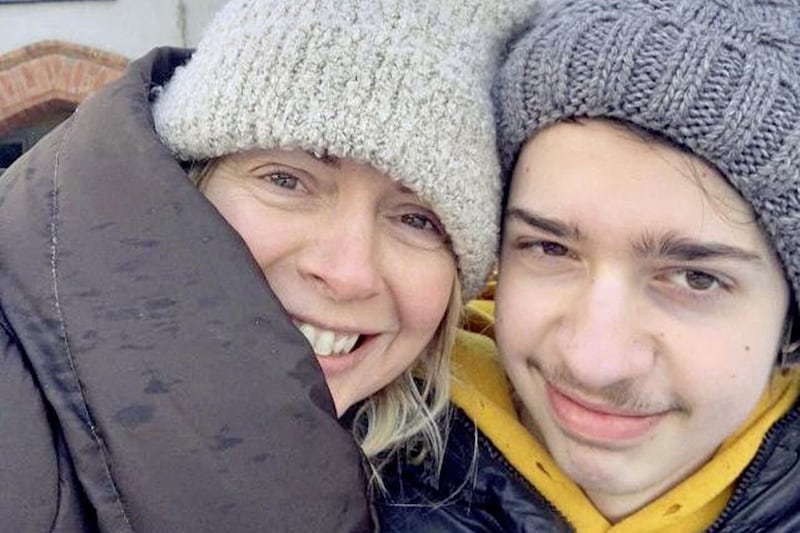WHEN Christine Doherty's middle son began complaining of severe abdominal pain which left him unable to walk or even straighten up sometimes, she had no idea it would lead to a "nightmare" journey to get him a diagnosis.
Kian (15), from the Carnhill area of Derry, suffers from a medical condition called functional neurological disorder (FND), which features nervous system symptoms that can't be explained by a neurological or physical disease. The symptoms, however, are real and can cause significant distress.
Typically, the disorder affects movement or the senses, such as the ability to walk, swallow, see or hear. It is relatively uncommon and Christine and husband Paul had never heard of it before.
Since Kian first became ill a few years ago, his parents have researched the condition and are now backing an awareness-raising campaign and petition by FND Hope to have it discussed at Parliament.
Christine, who works in the Northern Ireland Housing Executive, says it's been a long and bumpy road to have Kian diagnosed and that she wants more people to understand about the condition. For many who suffer from FND, their symptoms aren't visible so other people might not be aware of their disabilities. At present Kian's are not hidden as he is unable to walk without the aid of crutches or a wheelchair.
“Kian's illness began about a year before diagnosis,” explains Christine, who has two other sons, Ryan (17) and 11-year-old Evan. “We had him back and forth to A&E at Altnagelvin Hospital, probably twice a month.
“The pain in his stomach was so bad he was bent double. It was so distressing to see him in agony like that but his blood and urine tests came back clear.
“We were told he had non-specific abdominal pain and that it was quite common for his age group. Then we were told he was having abdominal migraines and so we treated the pain like a neurological headache. Sometimes he had to take to bed for three days because the pain was so bad but the length of those periods started to increase.
“He couldn't walk or get out of bed. No medication seemed to make a difference.”
With Kian having to take so much time off school, Christine was determined to get answers. But the medics were stumped too.
Then, in July 2019 an X-ray showed that Kian was suffering from fecal impaction, which had been causing the pain. Following treatment, he was able to stand straight and walk out of the hospital for the first time in a while.
The next month the family headed to Tenerife for a well-deserved holiday. Christine noticed Kian seemed run down and fatigued, but was in good enough form. Back home and at school again, he picked up a cold, which floored him. Then his condition became worse.
“One day he came downstairs. It took him ages to get down and he looked so ashen and grey in the face,” says Christine. “He sat down and I noticed he was slow in his speech; he was stuttering and his voice level was very low."
Kian's legs "seemed to be jumping or jerking and he complained of "wild pain" in his legs.
"It was almost like he as having non-epileptic seizures. His focus was poor and his eyes were glazed. I rang the hospital and they told me to bring in him right away,” recalls Christine.
It was there that one of the consultants mentioned conversion disorder to Christine, another term for FND. People with conversion disorder can experience blindness, paralysis or other symptoms and they usually begin suddenly after a period of emotional or physical distress. Kian's had been triggered by the long-term abdominal pain and the stress that came with it, resulting in a change in his brain chemistry.
“There are several markers with this disorder and Kian met them,” says Christine. “A big marker for him was constant nerve pain he felt in his quads. You couldn't touch his legs at all, he was so hypersensitive. He was also diagnosed with chronic fatigue as well as FND.”
Christine, who exhausted all her leave at work to look after Kian, has been home-schooling her three sons since the pandemic struck. Kian had only returned to school last January, for several hours a week, when lockdown saw the closure of schools.
Although he now uses a wheelchair to help him get about and he still struggles to do everyday things, Christine says he is in good spirits and just gets on with things. She has no idea what the prognosis is long term, but is hopeful his condition will improve over time.
One thing that has really helped, says Christine, is that the various agencies now adopt a multi-disciplinary approach to his care, treatment and education. At the request of his psychotherapist, she, along with Christine, a representative from the Education Authority, his physiotherapist, teacher and consultant meet up via Zoom every six weeks to discuss his progress.
His parents have also got support from FND Matters NI, which offers a website, Facebook page and peer support groups as well as counselling and a befriending service. The charity is holding a virtual conference on April 13.
Christine says: “Now that everyone involved in Kian's care has linked up, we're seeing a much clearer picture.
“He's improved so much and still has a long way to go but the difference between the boy he is now and the boy he was back in October 2019 is like night and day.
“At times it was an absolute nightmare trying to get to the bottom of it all and I had to become a deranged person to get someone to listen to me. But I'm glad we stuck at it.
“Kian still has bad days but he hasn't relapsed in months. Hopefully it will stay that way.”
:: For more see fndmattersni.org.uk or email fndmattersni@gmail.com. To sign the petition, go to https://petition.parliament.uk/petitions/565418.








